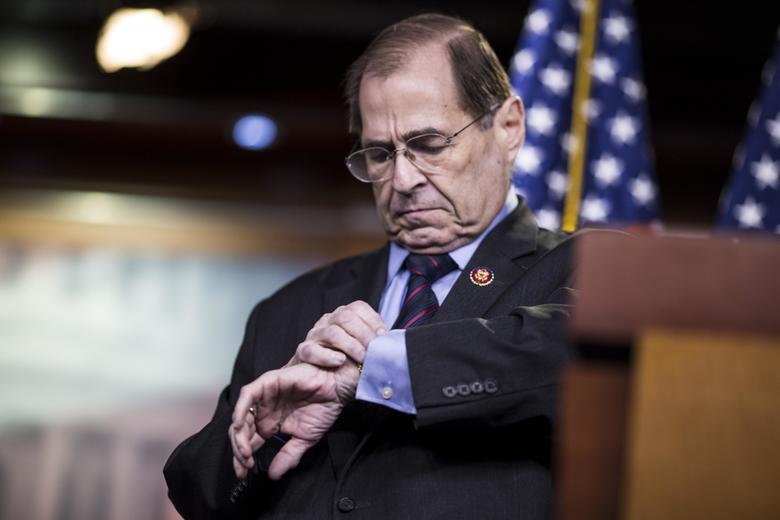So Nancy Pelosi has asked committee chairs to begin drawing up articles of impeachment. It’s widely reported that the House Dems want to have the articles voted on before Christmas, although I don’t see Pelosi giving any deadlines.
It’s my understanding that this doesn’t mean the House has stopped investigating, just that the impeachment vote isn’t going to wait for more evidence that might trickle in.
Are the Dems rushing? Maybe, but Josh Marshall argues that the Dems are better off moving quickly rather than dragging things out. Among other points:
… not allowing the President’s obstruction or the court’s lethargy to dictate the pace of events has allowed Democrats to maintain the initiative pretty much throughout. That is critical. It’s kept the White House off-balance and reacting to the Democrats. Just as it does in combat or sports maintaining the initiative is usually more than half of winning an engagement. I make you react to me and while you’re still reacting I pile still more on top of you. I have little doubt that this dramatically assisted House investigators in securing the testimony they did. It also signals and demonstrates strength, which is both politically advantageous and tends to force positive outcomes.
The evidence they have already provides an overwhelming case for removing Trump from office. Of course, there’s little to no chance that will happen. But I think the trial itself could have an impact on public opinion and the 2020 elections, so how the trial procedes in the Senate is important.
Alison Durkee writes at Vanity Fair that Mitch McConnell is fully prepared to shut Democrats out of the trial.
McConnell told reporters Tuesday that he’s preparing a “back-up plan” for figuring out the Senate rules, in case he’s not able to strike a bipartisan deal with Senate Minority Leader Chuck Schumer on how to structure the proceedings. And that plan, apparently, is to try and cut Democrats out entirely. “The first thing Sen. Schumer and I will do is see if there’s a possibility of agreement on a procedure,” McConnell said. “That failing, I would probably come back to my own members and say: ‘OK, can 51 of us agree how we’re going to handle this?’” The Majority Leader added that he wasn’t sure if he’d prefer a bipartisan deal or working solely with Republicans, telling reporters, “it would depend on what we would agree to.” Should both the bipartisan and partisan negotiations fail to figure out the trial procedure, the task would fall to Supreme Court Chief Justice John Roberts, who will be presiding over the trial. Roberts would submit motions to the Senate about the procedure, which could then be passed with 51 votes.
The Constitution is vague about how impeachments should be tried. This is Article I, Section 3, paragraph 6:
The Senate shall have the sole Power to try all Impeachments. When sitting for that Purpose, they shall be on Oath or Affirmation. When the President of the United States is tried, the Chief Justice shall preside: And no Person shall be convicted without the Concurrence of two thirds of the Members present.
As I wrote in an earlier post, in the two previous impeachment trials the Chief Justice ran the trial the way any judge would run any trial. The judge determines what evidence and witnesses are admissible, among other things. Judges don’t normally have to submit motions to the jury about procedure, I don’t think. If McConnell breaks with precedent and tries to limit the Chief Justice’s role and authority, what would C.J. John Roberts do? Would he go along? Maybe, but I don’t think that’s a certainty. It’s also the case that if McConnell rewrites the old rules to shut out the Democrats, there might be three Republicans who would say no. Assuming all the Dems vote no, three Republicans is all it would take to stop a rule change.
And if John Roberts is allowed genuinely to precide over the trial, he might compell evidence and witnesses we haven’t heard from yet. Or, he might just go along with whatever McConnell wants to do. Lots of ifs here.
If precedent is followed, the House will select managers to present the case to the Senate. In the past, these managers would assume the role of the prosecuting attorneys at the trial. Would McConnell shut them out, too?
One thing I’d like to say right now at the outset is that I’d like the House managers who will prosecute the case in the Senate to ask Chief Justice John Roberts to demand the presence of John Bolton, Mick Mulvaney, Rudy Giuliani and Mike Pompeo. These witnesses, and a few others at the State Department and Office of Management and Budget, are key to understanding the full parameters of the Ukraine scandal, and there is no reason that the Chief Justice of the Supreme Court, who presides as the judge of a Senate impeachment trial, cannot unilaterally enforce congressional subpoenas on the spot. He can also rule on any executive privilege claims on the spot.
McConnell no doubt knows this also and may try to limit the Chief Justice’s role to just keeping order in the court. To me, this pre-trial jockeying may be the most significant part of the whole process.
Finally, where is public opinion going? The Real Clear Politics polling average has “impeach and remove” at 48 percent and “no impeachment and removal” at 46.2 percent, so it’s close. Five Thirty Eight breaks it down a bit more, showing that a whopping majority of Democrats but hardly any Republicans favor removal; independents are 50-50. And so it goes.

